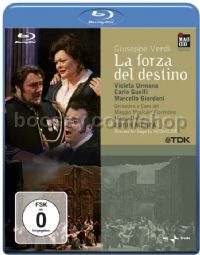La Forza Del Destino (TDK Blu-Ray Disc)
La Forza Del Destino (TDK Blu-Ray Disc)
Special Offer
* Estimated price converted from UK retail price
In his 2007 production for the Maggio Musicale in Florence, French opera director
Nicolas Joël – named as the next director of the Opéra de Paris from 2009
– presented his reading of Giuseppe Verdi’s La forza del destino (The Force of
Destiny). An adventure story and a tale of grim pursuit and unrelenting misfortune,
of faith, renunciation and - fi nally - death and forgiveness, Verdi’s La forza del
destino is, like an operatic road movie, also a portrait gallery of the different places
and curious people the main players meet along their way. As an opera dominated by big solo set pieces and long, complex duets, La forza del destino places special demands on everyone involved in bringing it to the stage: from the director, who is called upon to convey the dramatic development in those musical conversations and their place within a quite diffuse sequence of events, to the individual singers, each of whom is pushed to an extreme by Verdi’s vocal writing.
The singers all belong to the international opera scene and provide not only excellent
vocal quality but also strong acting skills, which help tell the gripping story with its
many disguises, various places and surprising discoveries: Lithuanian soprano Violeta Urmana fi rst took on the challenge of the part of Leonora at Covent Garden in 2004, not long after her graduation from mezzo-soprano - she made her début in the opera as Preziosilla - to the soprano she had always felt herself to be. Writing in the British magazine Opera, Matteo Sansone described her as an “excellent Leonora” and singled out for special praise her last-act aria, “delivered with intense emotion … in strong and luminous timbre”. Tenor Marcello Giordani is seen here making his début as Alvaro, an ostensibly dramatic role that nevertheless requires a sustained lyrical quality for one of Verdi’s most heartfelt tenor arias, “Oh, tu che in seno agli angeli”, with its
atmospheric prelude for solo clarinet. Alvaro’s antagonist, Don Carlo, is sung by Carlo Guelfi , a specialist in the great Verdi baritone roles, from Nabucco
to Iago, while bass Roberto Scandiuzzi plays the central, pacifying fi gure of the Padre Guardiano, conjuring up, again in the words of Sansone, “a feeling of religious fervour and genuine compassion in his duet with the anguished Leonora”. A counter part to the certainties of his faith is provided by Russian mezzo-soprano Julia Gertseva as a “spirited Preziosilla” and the all-too-human Brother Melitone of seasoned buffo bass Bruno De Simone.
Nicolas Joël’s production gives the work an unobtrusive update of about a hundred years from its composition, the period leading up to Italian Unifi cation,
suggesting that the Germans, upon whom Preziosilla calls for death, are not those involved in the War of the Austrian Succession, as imagined by Rivas and Verdi, but the country’s foreign occupiers, while Ezio Frigerio’s sets provide some dark Spanish visual contexts. And far from the music’s tub-thumping reputation, under the baton of Zubin Mehta, artistic director of the renowned Maggio Musicale festival, was a “thoughtful reading of the instrumental subtleties” that the Opera critic noted.




